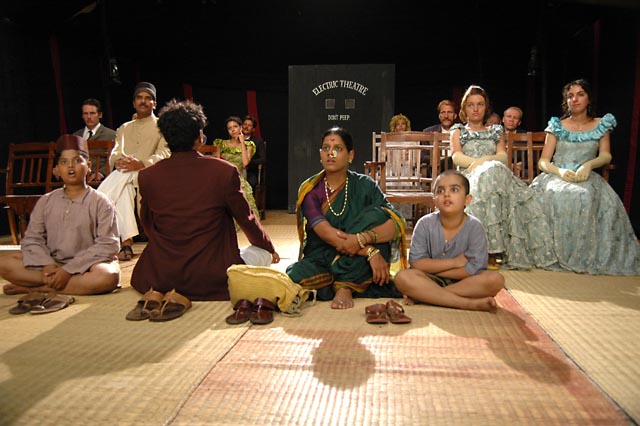
All you Bollywood fans, do you ever wonder how the Indian film industry got started almost a hundred years ago? Forget superstars, overseas locations, musicals and spicy dance item numbers – there wasn’t even sound! It’s hard to believe women’s roles were played by men since even prostitutes considered acting in the cinema too demeaning a task.
‘Harishchandrachi Factory’ is a wonderful little film – only 95 minutes compared to the 3 hour Bollywood blockbusters – and it is a journey into the making of India’s first film by Dhundiraj Phalke, who is acknowledged as the father of the Indian film industry. Back in 1911 few people had seen cinema, and films were only occasionally screened in tented theaters for the British and elite Indians. Phalke’s accidental encounter had him hooked, and the urge to make a film became an obsession.
This offbeat Marathi film really captures the passion and bravado which went into doing something totally new and revolutionary. Phalke was almost assigned to a mental hospital by well-wishers who just could not believe that pictures could actually move.
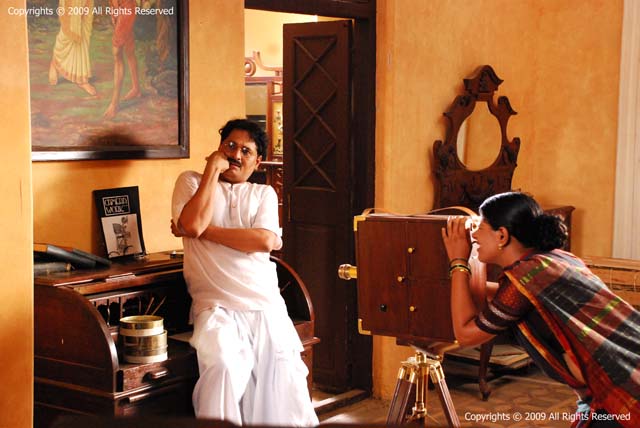
To make the first-ever film, Phalke had to mortgage everything from furnishings to his wife’s jewelry. In a striking similarity, Paresh Mokashi, writer and the debut director of the movie, mortgaged his property in order to raise money. He was lucky enough finally to find producers who believed in his project.
Mokashi, who was in New York recently, chatted about the making of the film and how he decided to use stage actors rather than famous movie stars: “I was very strongly convinced that I want these people, I don’t want any big stars to sell my film or this subject in general. So I stuck to what I wanted to make it, how I wanted to make it, and that is why it has become what it has become.”
The film is delightful and even more so because of the stellar cast, with Nandu Madhav as Dadasaheb Phalke and Vibhawari Deshpande as his spirited and supportive wife Saraswati. Whether it’s the rag-tag army of cast and crew that Phalke recruits or his two enthusiastic sons, the actors are all naturals.
The film has shown at several film festivals and has won many awards including the Best Director Award for Paresh Mokashi at the Pune International Film Festival. It was India’s official entry to the Academy Awards in the Best Foreign language film category. It did not make the Oscar shortlist but that’s Hollywood’s loss. In 2004 another Marathi film ‘Shwaas’ had been nominated for the Oscar.
It would be great if more films in regional languages were shown abroad. English subtitles remove all hurdles and the Marathi dialogues give the film a particularly authentic and pleasurable touch, a real slice of life feel.
‘Harishchandrachi Factory’ captures an excitement, the delirious madness which has to be there for something ground-breaking to happen, and tells a dramatic story with a light-hearted, homegrown touch. Dadasaheb Phalke would surely have approved.
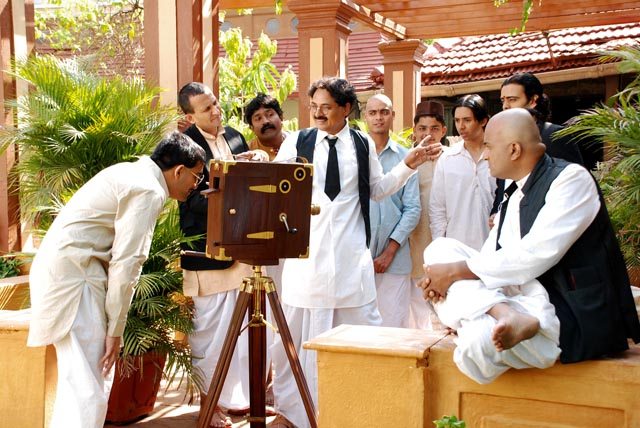
Paresh Mokashi was in New York a few months back and sat down with me for a one-on-one interview. I had not seen this delightful, slyly humorous movie then, otherwise I would have had many more questions!
Q: It must have been a big passion to make a film like this? How did the whole idea come about?
A: I did it just because nobody had done any film on this subject. In fact, ‘Harishchandrachi Factory’ is the first ever feature film on Dadasaheb Phalke and as you know, Dadasaheb Phalke is the father of Indian film industry. He made the first Indian feature film in 1913, and he started the process in 1911. I am showing his adventurous story in the making of India’s first feature film.
…
Q: Did you know much about Phalke as you were growing up?
A: See, as Maharastrians, we grew up with these stories of Dadasaheb Phalke and, you know, other stories of successful Maharashtrians. These were with me, around me, but finally in 2005 I read a biography on Mr. Phalke by Bapu Watve and that was the triggering point of sorts. While reading the biography I decided right then and there to make my first feature film on the subject.
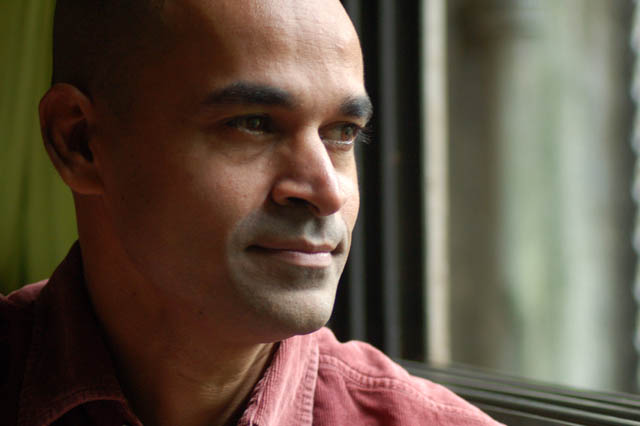
Q: How old were you then?
A: Well, I was 36 then, and now I am in my 40th year so it has taken a lot. The first two to three years I spent in a hunt for money, but nobody would support this movie, so I had to produce it on my own.
Q: What were you doing when you decided to make this movie?
A: I am a theatre person, I have been writing and directing plays since 10-15 years; before that I was an actor and then I shifted to writing and directing. That was my bread and butter for these many years. And since 2005, when I decided to make this film, I am completely with the film and nothing else.
Q: Did you try the major producers?
A: Frankly speaking, I did not have any contacts, so I cannot blame anybody. Some people were ready to finance it but on their own terms – like do it in Hindi, or use at least some big names or a couple of title tracks. You know, all sorts of those conditions were there, but I wanted to make the film the way I wanted to. I wanted to make it very simplistically and you know without larger-than-life picturization or glorification of Mr. Phalke, or the time.
Q: So how did you finally raise the money?
A: Well, it is a story that is a bit similar to Mr. Phalke’s. I had to raise the money on my own and now UTV and Paprika Media are supporting me. They have become equal partners in the venture. So all three of us are producers now and we are taking the film where one should take the film.
Q: Has it been shown in India yet?
A: Yes, a lot of people have seen it in festivals and, you know, private previews and they have supported the film and that is why now there are these fruits of, you know, Oscar nomination from India and rest of the other four to five national level festivals. We have won best film awards and things like that, and good things are happening for the film.
Q: You stayed away from a big name cast. How did you do the casting?
A: They are from stage and like we all know, stage people are not as famous as cinema people. So that difference will always be there, but I was very strongly convinced that I want these people, I don’t want any big stars to sell my film or this subject in general. So I stuck to what I wanted to make it, how I wanted to make it, and that is why it has become what it has become.
Q: What’s been the hardest part of making this film?
A: Technically there were lots of difficult hurdles and you tackle all those hurdles one by one as you start facing them, but I think the key decision was to stick to these two to three years of Mr. Phalke’s life. It was a creative decision to stick to only those couple of years in which he made ‘Raja Harishchandra’, the first film, and not an entire biography of Mr. Phalke, because otherwise it would have just become another biopic, which I really don’t approve of. And then people start falling into the same trap of a package of, you know, of biopics. They start from a flashback and go from birth to death – you know all the emotional and career-wise ups and downs. Unnecessary things get highlighted so most of the times the characters in the end turn into superheroes or gods – and I just wanted to avoid that thing happening with these characters.
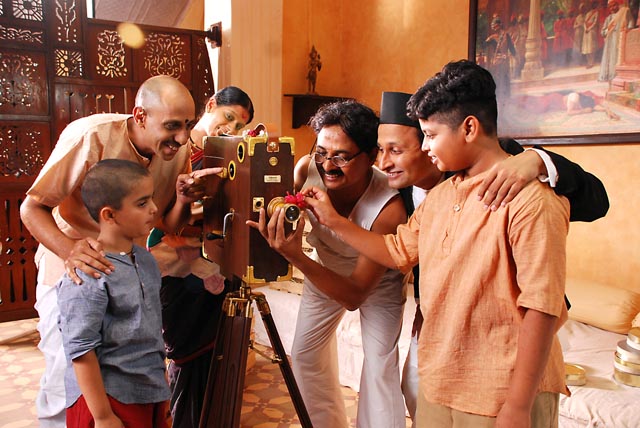
Q: Did you have to make any personal sacrifice in making this film?
A: Actually everything was clearly put on the table all the time and I don’t have anything to reveal, it was such an open book while I was making this film – I had to mortgage my property to raise the money. But then the people with whom I did the deal became the producers; because they understood why I did this thing and, so it was a very friendly kind of a deal. So hats off to them and to my family too who decided to take this step.
I am especially happy that for the first time Mr. Phalke’s adventure which has come on celluloid is going places. That is my main interest, to introduce this adventure into the world of Mr. Phalke.
(C) Lavina Melwani
(‘Harishchandrachi Factory’ was released in India on January 29 but viewers in the US will have to wait a bit longer to see the film.)
